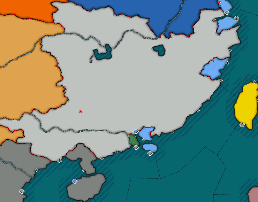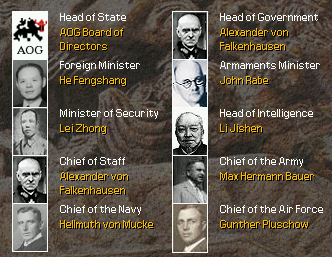Allgemeine Ostasiatische Gesellschaft
From Kaiserreich
| ||||
| Motto Gott mit Uns (God with us) | ||||
| Anthem Unabhängige März | ||||

| ||||
| Official Language | German | |||
| Capital | Guilin | |||
| Head of Government | Alexander von Falkenhausen, assisted by a Board of Directors | |||
| Establishment - Treaty of Nanjing | October, 27 1926 | |||
| Government | Autonomous territory under unlimited and exclusive economic exploitation from the German Empire | |||
| Currency | East Asian Papiermark | |||
| Area | 1.202.400 km² | |||
| Population | About 150 millions | |||
Algostasien GmbH, or officially Allgemeine Ostasiatische Gesellschaft (German for General East Asian Company), is a country in Asia, it borders to Qing Empire, Yunnan, Shangqing Tianguo, Legation Cities, Germany's colonies in China and Indochina and also Portugal with their colony in Macao.
Contents |
History
German colonization in China
In 1891 the Qing government decided to make the area of Tsingtao (also known as Qingdao) a defense base against naval attack and eventually began to improve Tsingtao’s existing fortifications. This Chinese activity was observed and reported by German naval officials during a formal survey of Kiautschou Bay in May 1897. After the Kiautschou Bay region was ceded to Germany in April 1898, the German authorities soon turned the impoverished fishing village of Tsingtao into a strategically important port administered by the Imperial Department of the Navy (Reichsmarineamt) rather than the Imperial Colonial Office (Reichskolonialamt). The navy based their Far East Squadron here, allowing the ships to conduct operations throughout the Pacific. The German imperial government planned and built the first streets and early infrastructure of the city (still visible today), introduced electrification throughout, a sewer system and a safe drinking water supply. German influence extended to other areas of Shandong Province, including the establishment of diverse commercial enterprises, especially in Yantai.
During the Weltkrieg, German's possessions in China were occupied by Japan, but the Peace with Honour restored German rule in 1921. A separate agreement between Germany and China placed Tangshan, located north of the port of Tianjin, under German control. Tangshan is an important heavy industry city and is also known as "the capital of porcelain in north China". After the end of the war, German companies became increasingly active, especially in South China.
The 1926 Intervention
On March, 12 1925, Xu Shichang managed to be elected Premier of the Kuomintang, to almost everyone's surprise due to his position of leader of a monarchist wing within a republican party. After having purged the Kuomintang, at the end of the year Xu issued a Call to the Mighty German Empire, where he described the situation of complete anarchy of China and praised the Kaiser Wilhelm II for its achievements; a delegation was also sent to Pu Yi's retreat in Tientsin. The Guominjun declared that the Kuomintang had betrayed the Republican cause and warlord Feng Yuxiang invaded the Kuomintang-controlled zone, after securing alliance with other northern warlords.
The Call touched German nationalist press, already managed by Alfred Hugenberg, which convinced German public opinion and Grossadmiral von Tirpitz's government of the need of a military intervention in China, in order to secure the Reich's interests in this area and to secure its influence in Asia, that had been deeply changed by the collapse of the British Empire, such as in Hong-Kong. Werner von Fritsch, then governor of Tsingtao, officially declared on December 1925 that the European concessions in China were now under his juridiction and that any violation and their terrorities by Chinese armies would mean an immediate response. Governor of German Indochina Hans von Seeckt, while receiving reinforcements for Germany, was sending weapons and mercenaries to the Kuomintang who was fighting against the Guominjun. On March, 8 1926, a smirkish between Guominjun soldiers near the German concession in Shanghai led to the declaration of war of Germany to China.
The campaign was made very quickly. In less than six months, German troops coming from Indochina and Tsingtau, supported by a blockade led by Grand Admiral Franz von Hipper, quickly overwhelmed the Guominjun forces; most of their leaders fled to Mongolia or Japan, or managed to retain some bastions in inner China, such as in Yunnan, or in Manchuria, which was invaded by Japanese forces during the German intervention. In the end, most of continental China was occuped by Sino-German forces. Following his own policies and after managing an agreement with former Emperor Pu Yi, Xu Shichang officially proclaimed the restoration of the Qing Empire on November 1926, following the Treaty of Nanjing that had delimited continental China: the south was left to the economic exploitation of German firms, while the north was under the restored Empire's control albeit under slight joint German-Japanese military control. Foreign trade was left to the richest cities of the coast, under a joint control of world powers owning interests in China. The new era of the Qing Empire officially began on February, 2 1927, date of the beginning of the Fire Rabbit Year.
Establishment of the Algostasien GmbH
The Treaty of Nanjing, signed on October 27 1926, awarded the Hainan Island to Germany and established in the South of China a zone under the economic exploitation of German firms: it was the birth of the Allgemeine Ostasiatische Gesellschaft. The functionaries in AlgOstAsien GmbH brought in a lot of European money and used China as a testing ground for radical production and administration techniques, leading to a quick industrialization. Hans von Seeckt was the first German Governor-General whereas Alexander von Falkenhausen was named Vice-Governor-General and Commander-in-Chief of the German colonial troops. As von Seeckt's right-hand man, Falkenhausen was determinant in the pacification of southern China, the reinforcement of the German-controlled Qing Empire and the training of the Native armies of the AOG. Despite being successful in many aspects of the German pacification, von Seeckt and Falkenhausen were unsuccessful against the growth of the Shangqing Tianguo, even if it was restrained to the mountains of western China. In 1932, after von Seeckt was recalled to Germany, Falkenhausen was naturally chosen by the Board of Directors as the new Governor-General.
Falkenhausen's achievements as Governor-General were not different from the ones he had already made as a subordinate. He encouraged the participation of Chinese collaborators to his government and unsuccessfully tried to warn his superiors about the threat of Japanese expansionism in the region. Another aborted project during his mandate was to ask the incorporation of either Hainan Island or Indochina to his authority, that was refused by his superiors in Berlin, fearing a dictatorial and colonial rule such as in Mittelafrika.
Politics
|
Governor-General and Chief of Staff of the German Colonial Forces: Alexander von Falkenhausen (born 29 October 1878)
Secretary for Relations with the German Empire: He Fengshang (born 10 September 1901)
Secretary for Economic Relations with Germany: John Rabe (born 23 November 1882)
Secretary for Internal Security: Lei Zhong
Secretary for Special Intelligence: Li Jishen
Commander-in-Chief of the Colonial Ground Forces: Max Hermann Bauer (born 31 January 1869)
Commander-in-Chief of the Colonial Navy: Hellmuth von Mücke (born 25 June 1881)
Commander-in-Chief of the Colonial Air Force: Günther Plüschow (born 8 February 1886)
Military
Army
Air Force
Navy
Foreign relations
Culture
|



